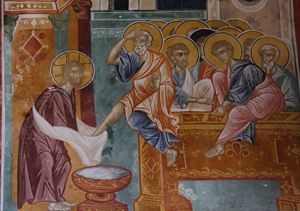by Rev. Dale Azevedo, Sr. Minister
Who celebrates Lent?
Lent is a season in the Christian Year. As such, it is celebrated by Christians. However, not all Christians celebrate Lent. Orthodox Christians, Roman Catholics, and many Protestants celebrate Lent. Mainline Protestants (Methodists, Lutherans, Episcopalians, Presbyterians, and such) are the most likely churches to celebrate lent. Baptists less so. And non-denominational, Pentecostal, or mega-churches, are even more unlikely to recognize the season. These latter communities are less likely to adhere to the Christian year at all (outside of Christmas and Easter), let alone the specific season of Lent.
What is Lent?
As I stated above, Lent is a season in the Christian year. It encompasses the 40 days leading up to Easter. And it is a season of self-examination, penitence, prayer, fasting, and works of charity.
Lent generally begins on Ash Wednesday. I say, “generally,” because in Orthodox traditions Lent begins on Clean Monday. Regardless of when Lent begins, it always lasts 40 days. However, each tradition counts those 40 days differently. In Protestant churches, Lent is the 40 days before Easter, not counting Sundays. In the Catholic Church, Lent is the 40 days before Easter, not counting Holy Week. And in the Orthodox tradition, it is the 40 days from Clean Monday until Good Friday. Of course, this is further complicated when we take into account that the Orthodox church celebrates Easter during a different week than its western counterparts. No wonder we can’t keep all this straight!
In Protestant churches, Lent is the 40 days before Easter, not counting Sundays. In the Catholic Church, Lent is the 40 days before Easter, not counting Holy Week. And in the Orthodox tradition, it is the 40 days from Clean Monday until Good Friday. Of course, this is further complicated when we take into account that the Orthodox church celebrates Easter during a different week than its western counterparts. No wonder we can’t keep all this straight!
When did Lent become a thing?
Lent was not always a season or practice in Christianity. There are references early in Christian history of a time of fasting before Easter. However, these observances were much shorter, lasting either all of, or only a portion of, Holy Week. There are also references to a time of preparation for new initiates into the church in the days or weeks leading up to Easter. However, scholarship in recent years has drawn these references into question. Either way, while it may not have resembled our season of Lent, there does appear to have been some time of personal preparation and spiritual observance in the days leading up to Easter.
The oldest reference to a 40 day fast period prior to Easter is found in the records of the Council of Nicaea (325 C.E.). These references imply that such a practice was already taking place in some communities by this time and not an original decree of the council. Based on other historical records, it is  commonly believed that by the end of that century most Christian communities were observing some kind of fast in the 40 days leading up to Easter.
commonly believed that by the end of that century most Christian communities were observing some kind of fast in the 40 days leading up to Easter.
Finally, the word Lent is believed to be derived from the Old English word lecten, which is a reference to the season of spring. It is surmised that since the 40 days of fasting took place during spring in the English speaking world, a shorter version of the word lecten, Lent, eventually became associated with the practice.
Where is Lent practiced?
Lent is practiced wherever Christians are, both globally and personally. There are Christian communities around the world that observe the season of Lent. It may be more rare to find Christians in the far east than here in the west, but they are there. And undoubtedly, some of them celebrate Lent. Individually, Lent can be observed wherever we are. We observe Lent in church, in our homes, and all throughout our daily lives (work, school, running errands, etc.). Lent is not restricted to sacred places or times. Depending on how we celebrate Lent, it can be anywhere and everywhere.
How is Lent observed?
Lent is observed in many ways. As I mentioned earlier it is a season of self-examination, penitence, prayer, fasting , and works of charity. For recent generations there has been a common practice of “giving something up” for Lent. This can be chocolate, cursing, alcohol, etc. This practice serves two purposes. First, it harkens back to the days of fasting for whole meals. When we give something up, we miss it, and that feeling of loss reminds us both of Christ’s suffering and of our desire to draw nearer to God. It serves as a simple and constant reminder to stop, pray, and think of God. Second, giving something up ought to help cleanse us physically or spiritually. We are better people if we give up something that otherwise would drag us down.
, and works of charity. For recent generations there has been a common practice of “giving something up” for Lent. This can be chocolate, cursing, alcohol, etc. This practice serves two purposes. First, it harkens back to the days of fasting for whole meals. When we give something up, we miss it, and that feeling of loss reminds us both of Christ’s suffering and of our desire to draw nearer to God. It serves as a simple and constant reminder to stop, pray, and think of God. Second, giving something up ought to help cleanse us physically or spiritually. We are better people if we give up something that otherwise would drag us down.
However, “giving something up” isn’t the only way to observe Lent. In recent decades I have heard a lot more about people “taking things on,” instead. This can mean taking on a new exercise routine or diet, taking on an act of charity or helping someone out each day, or taking on practice of daily prayer or scripture reading. The options for taking things on are just as endless as the options of giving things up, but the end result is the same: finding an observance for the season that not only helps you grow as a person, but also draws you closer to the God you love.
This leads us to our final question…
Why do we celebrate Lent?
The main purpose of Lent is to deepen our relationship with God. All of the practices we undertake, all of the things we “give up,” all of the observances we “take on,” should all lead us to a closer sense of God with us. God wants nothing more than to live in communion with us. Yet, so much of what we do in life  pushes God away. We make poor choices. We neglect ourselves and our neighbors. We chase after false idols. And in the end, we feel bad; physically, emotionally, and spiritually. Lent is about helping us to feel good again, on all these levels. Lent is about renewal and rebirth. Only it acknowledges that before we can feel that, before we can experience that, we first need to prepare ourselves for it. We need to cleanse ourselves, removing so many of the things that drag us down and providing room for the things that lift us up. So if you are struggling this season, or even if you just want to feel even better than you already do, consider observing a holy Lent. Consider making something new a part of your life this season. Consider joining us for worship and seeing what blessings God has to offer. Amen.
pushes God away. We make poor choices. We neglect ourselves and our neighbors. We chase after false idols. And in the end, we feel bad; physically, emotionally, and spiritually. Lent is about helping us to feel good again, on all these levels. Lent is about renewal and rebirth. Only it acknowledges that before we can feel that, before we can experience that, we first need to prepare ourselves for it. We need to cleanse ourselves, removing so many of the things that drag us down and providing room for the things that lift us up. So if you are struggling this season, or even if you just want to feel even better than you already do, consider observing a holy Lent. Consider making something new a part of your life this season. Consider joining us for worship and seeing what blessings God has to offer. Amen.



